Aswb masters exam - Study guides, Class notes & Summaries
Looking for the best study guides, study notes and summaries about Aswb masters exam? On this page you'll find 110 study documents about Aswb masters exam.
Page 4 out of 110 results
Sort by
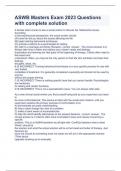
-
ASWB Masters Exam 2023 Questions with complete solution
- Exam (elaborations) • 10 pages • 2023
-
Available in package deal
-
- $12.49
- + learn more
ASWB Masters Exam 2023 Questions with complete solution A female client comes to see a social worker to discuss her relationship issues. According to the psychosocial perspective, the social worker should: (A) have her tell you about the issues affecting her life (B) begin training behavioral techniques (C) provide a referral to a psychologist for testing (D) refer to a marriage
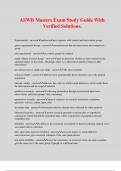
-
ASWB Masters Exam Study Guide With Verified Solutions.
- Exam (elaborations) • 20 pages • 2024
- Available in package deal
-
- $12.49
- + learn more
ASWB Masters Exam Study Guide With Verified Solutions. Experimental - answerrandomized/most rigorous with control and intervention groups quasi-experimental design - answernonrandomized but has intervention and comparison group pre-experimental - answerno control group/ the weakest single-subject research design - answeraims to determine whether an intervention has the intended impact on the client- AB design where A is intervention and B is behavior after intervention pre and post test...
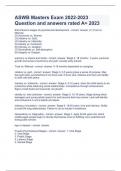
-
ASWB Masters Exam 2022-2023 Question and answers rated A+ 2023
- Exam (elaborations) • 8 pages • 2023
-
Available in package deal
-
- $12.99
- + learn more
ASWB Masters Exam 2022-2023 Question and answers rated A+ 2023 Erik Erikson's stages of psychosocial development - correct answer (1) Trust vs. Mistrust; (2) Autonomy vs. Shame; (3) Initiative vs. Guilt; (4) Industry vs. Inferiority; (5) Identity vs. Confusion; (6) Intimacy vs. Isolation; (7) Generativity vs. Self
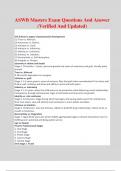
-
ASWB Masters Exam Questions And Answer (Verified And Updated)
- Exam (elaborations) • 7 pages • 2024
- Available in package deal
-
- $12.49
- + learn more
ASWB Masters Exam Questions And Answer (Verified And Updated) Erik Erikson's stages of psychosocial development (1) Trust vs. Mistrust; (2) Autonomy vs. Shame; (3) Initiative vs. Guilt; (4) Industry vs. Inferiority; (5) Identity vs. Confusion; (6) Intimacy vs. Isolation; (7) Generativity vs. Self-absorption; (8) Integrity vs. Despair. autonmy vs shame and doubt Stage 2. 18 months - 3 years. personal growth and sense of autonomy and guilt. Usually potty trained. Trust vs. Mistrust ...
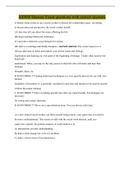
-
ASWB Masters Exam questions with correct answers
- Exam (elaborations) • 14 pages • 2023
- Available in package deal
-
- $12.99
- + learn more
A female client comes to see a social worker to discuss her relationship issues. According to the psychosocial perspective, the social worker should: (A) have her tell you about the issues affecting her life (B) begin training behavioral techniques (C) provide a referral to a psychologist for testing (D) refer to a marriage and family therapist - correct answer The correct answer is A Always take time to listen and explore your clients' needs and feelings. Exploration and learning are vi...
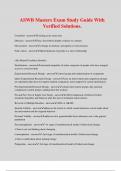
-
ASWB Masters Exam Study Guide With Verified Solutions.
- Exam (elaborations) • 13 pages • 2024
- Available in package deal
-
- $12.49
- + learn more
ASWB Masters Exam Study Guide With Verified Solutions. Comorbid - answerExisting at the same time Delusion - answerFalse, fixed belief despite evidence to contrary Dissociation - answera change in memory, perception or consciousness Folie a deux - answerShared delusion of people in a close relationship (Aka Shared Psychotic disorder) Stratification - answerstructured inequality of entire categories of people who have unequal access to social rewards Experimental Research Design - answer...

-
Social Work ASWB Masters Exam Guide: A Comprehensive Study Guide for Success|2023 LATEST UPDATE|GUARANTEED SUCCESS
- Exam (elaborations) • 19 pages • 2023
-
Available in package deal
-
- $13.99
- + learn more
SYSTEMS THEORY A system is a whole comprising component parts that work together. Applied to social work, systems theory views human behavior through larger contexts, such as members of families, communities, and broader society. Important to this theory is the concept that when one thing changes within a system, the whole system is affected. Systems tend toward equilibrium and can have closed or open boundaries. Ecomaps and genograms can help to understand system dynamics. closed syst...
ASWB Masters Exam Bundle With Verified And Updated Solutions.
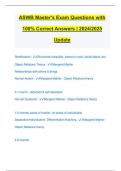
-
ASWB Master's Exam Questions with 100% Correct Answers | 2024/2025 Update
- Exam (elaborations) • 15 pages • 2024
-
- $10.69
- + learn more
ASWB Master's Exam Questions with 100% Correct Answers | 2024/2025 Update Stratification - Structured inequality, based on race, social status, etc. Object Relations Theory - Margaret Mahler Relationships with others & things Normal Autism - Margaret Mahler - Object Relations theory 0-1 month - detached & self absorbed Normal Symbiotic - Margaret Mahler - Object Relations theory 1-5 months aware of mother, no sense of individuality Separation/Individuation: Differentiation/Hatching - ...
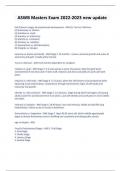
-
ASWB Masters Exam 2022-2023 new update
- Exam (elaborations) • 8 pages • 2023
-
- $10.99
- + learn more
ASWB Masters Exam new update Erik Erikson's stages of psychosocial development - ANS (1) Trust vs. Mistrust; (2) Autonomy vs. Shame; (3) Initiative vs. Guilt; (4) Industry vs. Inferiority; (5) Identity vs. Confusion; (6) Intimacy vs. Isolation; (7) Generativity vs. Self-absorption; (8) Integrity vs. Despair. autonmy vs shame and doubt - ANS Stage 2. 18 months - 3 years. personal growth and sense of autonomy and guilt. Usually potty trained. Trust vs. Mistrust - ANS 0-18 months d...

How much did you already spend on Stuvia? Imagine there are plenty more of you out there paying for study notes, but this time YOU are the seller. Ka-ching! Discover all about earning on Stuvia


